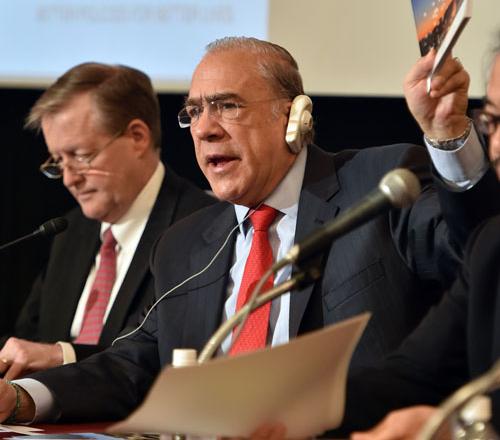You are here
OECD chief credits loose monetary policy for averting catastrophe
By AFP - Apr 15,2015 - Last updated at Apr 15,2015

TOKYO — The head of the Organisation for Economic Cooperation and Development (OECD) on Wednesday credited a wave of loose monetary policy for preventing a global economic collapse, but warned it was now up to governments to lift growth and safeguard their economies.
Angel Gurria, secretary general of the OECD, made the comments in Tokyo where the 34-member club of rich nations was presenting its latest report on the Japanese economy.
The world owes a "debt of gratitude to central bankers" for supplying easy money that brought the global economy back from the brink after the 2008 financial crisis, Gurria said.
"They have done a great job. Without central bankers...we would be in a bigger problem," Gurria told reporters.
"But the problem is now structural changes [that] are not in the hands of central banks. Education, innovation, more competition, better regulations...These have nothing to do with central banks," he added.
While the Bank of Japan's massive monetary easing programme has boosted growth, Gurria said the country's living standards lag the OECD average and Tokyo must press on with an overhaul of the highly regulated economy, including luring more women into the workforce, shaking up a rigid labour market, and lifting productivity.
A string of central banks, including the European Central Bank, the Reserve Bank of India and the Bank of Korea, have launched monetary easing schemes or cut interest rates to prop up their ailing economies.
Meanwhile, the US Federal Reserve announced it was ending its own six-year quantitative easing scheme as the world's top economy gets back on track.
Gurria also warned that Japan had to get a handle on its massive national debt, the heaviest burden among OECD members at more than twice the size of the economy.
Tokyo raised the national sales tax in April 2014 to 8 per cent from 5 per cent to help pay down that debt load, but the move slammed the brakes on growth and sent the economy into a brief recession.
Prime Minister Shinzo Abe delayed a second tax rise to 10 per cent scheduled for this year, but that rate is still only about half the OECD average of 20 per cent, Gurria said.
A day after the International Monetary Fund raised its growth projections for Japan, the OECD on Wednesday hiked its forecasts to a 1 per cent expansion this year and 1.4 per cent next, up from an earlier 0.8 per cent and 1 per cent, respectively.
Abe launched his economic growth blitz in 2013, dubbed Abenomics, combining huge monetary easing, big government spending and promises to overhaul Japan's economy.
But there is still a lot of work to do on the so-called third arrow of his plan — reforms.
"The third arrow of Abenomics is its most crucial component, without which the unprecedented monetary expansion and the fiscal effort will not succeed in putting Japan on a path to faster growth and fiscal sustainability," the OECD's report said.
Separately, latest OECD data showed growth momentum is strengthening in the eurozone, while China's economic expansion is slowing.
"In Italy and France, the signs of a positive change in momentum, which were assessed as tentative in March, have now been confirmed," the OECD said in a statement.
The OECD's composite leading indicators (CLIs), designed to anticipate turning points in economic activity, also showed a positive change in momentum for Germany.
The figures will come as a relief to the European Central Bank, which recently launched a 1.1-trillion-euro ($1.2-trillion) bond buying programme to boost sluggish growth and ward off deflation.
Of particular concern have been France and Italy, the eurozone's second- and third-largest economies, which have been stagnating.
In Italy, which saw its economy contract 0.3 per cent last year, the government is forecasting 0.7 per cent growth this year.
France's government is forecasting 1 per cent growth this year, after a meagre 0.4 per cent expansion in 2014.
The Paris-based organisation which provides economic analysis and advice to its 34 industrialised country members, said the growth outlook was stable in the OECD area as a whole as well as for the United States, Britain and Japan.
Meanwhile, "CLIs signal growth easing in China and Canada, albeit from relatively high levels”.
China, not an OECD member, has been a major source of global growth, but the world's second-largest economy has been experiencing a broad slowdown in recent years.
Purchasing manager surveys, one leading indicator, have recently shown Chinese manufacturing steady, while official data released earlier this month showed output, retail and investment growth have all fallen to multi-year lows.
China's economy expanded 7.4 per cent last year, the worst result since 1990, and earlier this month leaders lowered this year's target to approximately 7 per cent.
For other emerging markets, the CLIs point to slowing growth momentum in Brazil and Russia, and firming growth in India.
Related Articles
The Organisation for Economic Cooperation and Development (OECD) called Thursday on the world's leading countries to step up measures to support flagging global growth, in particular urging the European Central Bank (ECB) to overcome its reluctance and undertake quantitative easing.
PARIS — The world economy is likely headed for a soft landing next year, the Organisation for Economic Co-operation and Development (OECD) s
PARIS — The world risks getting caught in a low-growth trap, denting the future of generations to come, unless governments step up spending

















